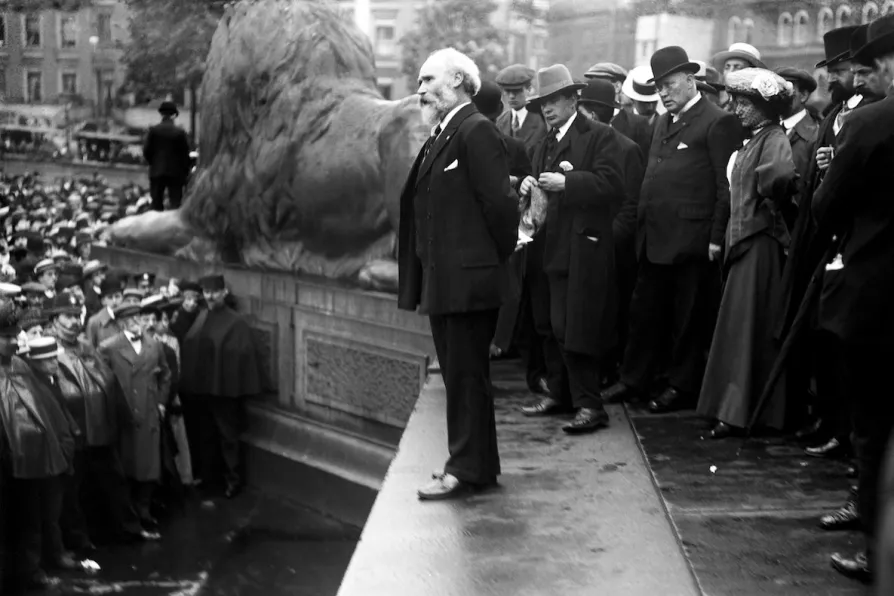Once the bustling heart of Christian pilgrimage, Bethlehem now faces shuttered hotels, empty streets and a shrinking Christian community, while Israel’s assault on Gaza and the tightening grip of occupation destroy hopes of peace at the birthplace of Christ, writes Father GEOFF BOTTOMS

 Labout Party founder Keir Hardie addresses a crowd in Trafalgar Square in January 1910
Labout Party founder Keir Hardie addresses a crowd in Trafalgar Square in January 1910
ONE hundred and thirty years ago in April 1888, Keir Hardie stood in the Mid Lanarkshire by election.
The Liberal Party did not support him and his defeat propelled Hardie, along with Cunninghame Graham, towards the creation of an independent party of labour intent on working-class representation.
Tory/SNP collusion must and will be exposed if the Scottish Labour Party takes the political weapons it has now forged and challenges them in Scotland’s working-class heartlands
The anniversary of the founding of the Scottish Labour Party should be celebrated with added enthusiasm this year by Scottish Labour members because for the first time in a long time, the Scottish Labour Party will reflect the radicalism of its founders.
In Richard Leonard it has a leader and increasingly a set of policies that are capable of winning working-class support that could lead to a majority of both Holyrood and Westminster seats.
This has earned him fierce opposition from both the Scottish Tories and the SNP. We should not be surprised at this unseemly alliance of Tories and SNP.
Jeremy Corbyn and Leonard represent a clear and present danger to the Tories and the nationalists and both parties were happy to collude to divert council cuts, the exposure of outsourcing, the pensions crisis, unequal pay, the decline in oil and gas exploration, the continued betrayal of our fishing communities and any other semblance of class politics to “any other business” while Russia-bashing goes straight to the top of the agenda.
For make no mistake about it, the policies adopted by the Scottish Labour Party at this year’s conference, policies based on class, are capable of building a movement for profound social and economic change in Scotland.
They were largely ignored by the “commentariat,” but you only need to consider the section of the policy covering the economy to get a sense of the challenge Scottish Labour is now posing to the apologists of the existing system: “The privatisation of our public services has been a national failure — it’s time to take back control.
Public ownership and control over our essential public goods and services can lead the fight for social and environmental progress.”
The policy document does not stop at generalities. Here are three specific commitments from the many that flow from the general espousal of public ownership: “Commit to signing no new private finance deals; explore how to bring existing contracts back in-house; and to develop alternative public-sector models for funding … Publicly provide public services, such as health and social care services, so ensuring quality and co-ordination; work proactively with councils to develop municipal ownership in policy areas like buses, social care, building, energy and land.”
These commitments are equally intolerable to the Tories, whose backers have benefited enormously from PFI contracts, and the SNP which has twice failed to even re-regulate buses, never mind bring them into public ownership, and which has also enjoyed considerable financial support from Brian Souter — owner of the large private bus company, Stagecoach.
The SNP has also sought to build an alliance with third-sector organisations. Scottish Labour’s policy is clearly designed to address concerns about their use as a form of outsourcing — 34 per cent of third-sector activity is now in social care.
In local government too, the Tories and the SNP have a symbiotic relationship. At Westminster the Tories squeeze public expenditure; at Holyrood the SNP curates the cuts for the Scottish public in as acceptable way as they can, carefully avoiding any distress to their middle-class supporters.
Contrast this to Scottish Labour’s commitment in the conference policy document: “Local councils can also lead the way in the fight against poverty and inequality … More resources for our services is not just about grants from the government. It’s also about real powers. Local services have to be released from their shackles. Scotland’s local councils must also be allowed to raise additional revenue.”
Tory/SNP collusion must and will be exposed if the Scottish Labour Party, working with the wider movement, takes the political weapons it has now forged and challenges the Tories and the SNP in Scotland’s working-class heartlands: in the schemes of Dundee and Glasgow and Edinburgh, in the neglected mining villages of West Lothian and Fife, in the “beautiful wastelands” of the Highlands and islands and everywhere else where neoliberal greed let whole communities go to rot.
One hundred and thirty years on since the creation of the Scottish Labour Party in April 1888, and we still encounter the indifference of wealth faced with the human degradation caused by capitalism’s excesses.
But now we have a real chance to challenge that. Scottish Labour must use this opportunity to transform itself and the communities it was created to save and nothing and no-one should be allowed to get in the way.
Vince Mills is secretary of Scottish Labour Left.

As Reform UK threatens to capitalise on public anger, our Establishment politicians simply refuse to acknowledge their role in creating the very alienation that gives succour to Farage, writes CRAIG ANDERSON













